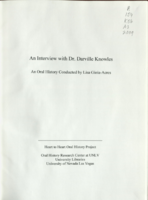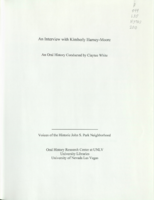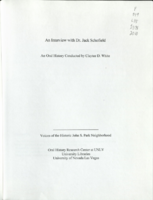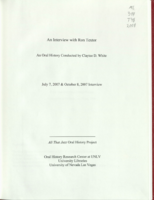Search the Special Collections and Archives Portal
Search Results

Irene Cepeda interview, April 24, 2019: transcript
Date
Description
Interviewed by Monserrath Hernández, Nathalie Martinez and Rodrigo Vázquez. Irene Cepeda is a woman dedicated to serving the Latinx as well as all minority groups in education in Southern Nevada. As a Las Vegas native, she grew up alongside the Latinx community here and is a proud Latina from Nicaraguan roots. She is dedicated to uplifting the Latinx community through her work with the Latino Youth Leadership Conference and college access specialist at Nevada State College. Now, as representative of District D on the Clark County School District Board of Trustees, she seeks to tackle the issues the district faces from acts of White supremacy to a lack of funding for English Language Learner families.
Text

Ron Current interview, March 16, 2012: transcript
Date
Archival Collection
Description
Ron Current's heart was always in the right place, with respect to social activism and his dedication to empowering the black community in Las Vegas. Inspired by Black Panther Party founders, Huey P. Newton and Bobby Seale, Ron started the Black Panther Party Las Vegas Chapter. He was also the director of public relations for the National Alliance Against Racist and Political Repression; an organization created to work in tandem with the National Association for the Advancement of Colored People, NAACP, to eliminate racial inequality. Ron describes the overall atmosphere of the Westside community in Las Vegas during the early days, as chaotic, drug infested, and riddled with daily gang related shootings. He also recalls the historic preservation attempts made by leading members of the Westside community, such as Sarann Knight Preddy. Ron recalls working at the University Medical Center while recruiting for the Black Panther Party Las Vegas Chapter. This interview demonstrates the power of love. As the founder and leader of the Black Panther Party Las Vegas Chapter, Ron was named one of the most influential blacks in Las Vegas by the Sentinel Voice. He recalls utilizing his hands-on leadership approach towards capacity building and the successful implementation of community mobilization strategies and methods. He was a champion for educational equity, equal access to employment opportunities, and economic equality in Las Vegas, Nevada.
Text

Transcript of interview with Dr. Darville Knowles by Lisa Gioia-Acres, October 9, 2008 and November 9, 2008
Date
Archival Collection
Description
Dr. Darville Knowles was born in Miami, Florida, in 1948. His mother and father were schoolteachers in Dade County. After their divorce in 1962, Darville's mother relocated to Las Vegas with her two sons and took a teaching position here. Dr. Knowles comments on the differences between Miami and Las Vegas as far as segregation regarding housing, education, and job opportunities. He also mentions that his grandmother had emigrated from the Bahamas and that she impressed on them to make their own situation and community better. He recalls that track and field athletics were desegregated before the contact sports, such as football and basketball. Darville and his brother Michael (a lawyer in Miami) both graduated from college. Darville attended Howard University and Stanford University Medical School and completed his internship at the Jewish Hospital of St. Louis. Dan Wilkes, a family friend and pathologist in Las Vegas, convinced Darville to look at Las Vegas for job opportunities. After trying St. Louis, Atlanta, Houston, and Los Angeles, Dr. Knowles finally settled in Las Vegas in 1982 and "grew' his practice at Sunrise Hospital. Dr. Knowles comments on health problems in Las Vegas related to eating choices, lack of exercise, and poor air quality. He describes how HMOs have changed the practice of medicine and gives his opinions on how health care should be addressed by Congress. He also discusses the future of medicine, the research he was involved in, and the AIDS crisis. Dr. Knowles talks about how medicine has changed since 1982, the large number of respiratory problems that he treats, and comments further on HMOs and the fixture of medicine in Las Vegas. He also shares that he found time to author a murder mystery and has plans to write more.
Text

Transcript of interview with Kimberly Harney-Moore by Claytee White, June 16, 2010
Date
Archival Collection
Description
Kimberly Harney-Moore and her three siblings were raised in the John S. Park Neighborhood in the 1960s and 1970s. Their parents, Tim and Kathleen Hamey, were educators. A nostalgic feeling for the neighborhood remains; perhaps, rekindled when she had close friends buy a house across the street from her childhood home. In this interview, Kimberly talks about the inviting character of the area's architecture, mentions a few names of neighbors she babysat for, and fondly recalls her job at Luv-Its Custard shop. There was a time when she would drive through the old neighborhood and be saddened by the lack of upkeep and the changes, but today it is a place being reborn to a new generation. Note: Tim Harney and Kathleen Harney, Kimberly parents, are also participants in the Voice of the Historic John S. Park Neighborhood oral history project.
Text

Transcript of interview with Christopher Phipps by Dennis McBride, November 6, 1998
Date
Archival Collection
Description
Christopher Phipps, attorney in Las Vegas discusses his life. Hailing from Honolulu, Hawaii, and his adventure that led him to Las Vegas, Nevada.
Text

Transcript of interview with Kerin Scianna Rodgers by Dennis McBride, February 24, 1998
Date
Archival Collection
Description
Kerin Rodgers owned a retail fashion store and modeling agency with a friend in Santa Monica, California. She came to Las Vegas in 1966 to work at The Broadway department store. She bought a home in the John S. Park Neighborhood in 1974. Popular radio personality; active in local and national politics.
Text

Transcript of interview with Dr. Jack Lund Schofield by Suzanne Becker, January 13, 2009
Date
Archival Collection
Description
In the dusty border town of Douglas, Arizona, Dr. Jack Lund Schofield was born in the family home in 1923. Due to the economic woes of the Great Depression, the Schofield family moved several times until 1937—the year that Jack's father took a position as a tungsten broker and moved his family of five children to Nevada. For Jack, who was ready to start high school, the move from Phoenix to Las Vegas with a small population of 5000 was a shock. However, it did not take the gregarious Jack long to make friends at Las Vegas High School. He played sports and was a Golden Glove boxing champion. As Jack's high school years drew to an end, two major events occurred: he met his future wife and World War II began. He proudly highlights his service as a fighter pilot in both WWII and the Korea conflict, his family genealogy, and his devotion to being an excellent educator, businessman, family man, and politician. In 1995, he earned his doctorate in education at the age of 72. His resume includes being an elected official, serving on the Board of Regents and having a middle school named after him. Jack and his wife, Alene, have resided in the John S. Park Neighborhood for over 50 years and describes his affection for the neighborhood and some of the changes that have occurred.
Text

Transcript of interview with Ron Textor by Claytee White, July 24, 2007 & October 8, 2007
Date
Archival Collection
Description
Ron Textor grew up in Kirksvile, MO shortly after moved to Flint. MI; father was a doctor and mother a school teacher; started piano lessons at 5 and trombone at 8; attended classes at the Stan Kenton clinics at Michigan State University; National Stage Band Camp at Cleveland at the Western Reserve University; started own band at age 14 in Flint, MI; graduated high school in 1965; went to Central Michigan University graduated in 1969 with a bachelor's in music; 1972 released from the army and joined the Glenn Miller Orchestra under Buddy DeFranco; trumpet player Tom Snelson — Phantom of the Opera; The Airmen of Note; Colorado Springs Symphony Orchestra; recording at RCA Victor in Tokyo; 50 weeks a year of one-nighters; St Regis Roof in New York City; book by George Simon on Glenn Miller; Medina Ballroom; traveling by bus; rehearsal with Frank Sinatra; master's degree from Central Michigan; taught college at Michigan, Central, and Alma College; Mott Community College; moved to Wisconsin and taught at Mount Scenario College in the late 70 s; General Motors; Genesee County Fine Arts Council; CETA; Detroit Montreux Jazz Festival; 1981 Montreux Switzerland Jazz Festival; North Sea Jazz Festival at the Hague in Holland; move to Las Vegas 1981.
Text

Transcript of interview with Jack Levine by Suzanne Becker, June 28, 2007
Date
Archival Collection
Description
Jack LeVine offers a narrative as a real estate agent and a gay man who has lived in Las Vegas since he was a young adult in the 1980s. He first started visiting Las Vegas whenever his truck driver routes allowed him to visit his parents who had moved here in 1977. They owned a downtown sandwich and catering business called Your Place or Mine. Then in 1985 Jack and his life-partner, J.J., decided to relocate to Las Vegas. Jack soon launched a real estate career that began with the purchase of a 13-unit apartment complex. Over the years he became knowledgeable about the history of the greater community and the individual neighborhoods; including John S. Park—"the earliest suburb in Las Vegas. Jack and J.J have lived in a 1954 Mid-Century Modern home since the mid-1990s. Jack is a strong believer in re-gentrification and mentions other cities where this has been successful. His philosophy includes an explanation of the sense of community that is derived from those who invest of themselves in that community life John S. Park.
Text

Harold McKay interview, March 13, 1981: transcript
Date
Archival Collection
Description
On March 13, 1981, Dana Jamerson interviewed Harold McKay (b. July 27th, 1903 in Dresden, Kansas) about his life as a teacher in Las Vegas, Nevada. McKay speaks about his education, his move from Chicago, Illinois to Las Vegas and how he began his career in education. McKay focuses on how and why he founded the Teacher’s Credit Union, his time working in administration and his business school, as well as the problems related to segregation and integration in the educational system. Lastly, he talks about the growth of the gaming and entertainment industry in Las Vegas, and his volunteer work with the Senior Citizen Center.
Text
